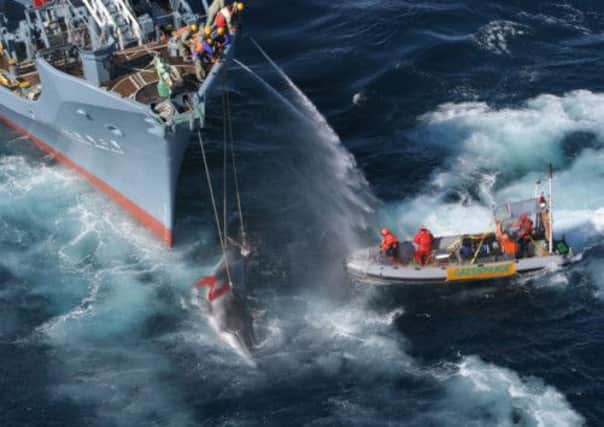‘Japan’s whale hunt a sham’, say Australian lawyers


Australia’s case at the International Court of Justice, supported by New Zealand, is the latest step in years of attempts by governments and environmental groups to halt the Japanese whaling fleet’s annual trips to harpoon minke and fin whales for what Tokyo argues is scientific research allowed under international law.
Australia calls the research claim a front for a commercial hunt that puts whale meat on plates across the country. Commercial whaling was halted by a 1986 moratorium.
Advertisement
Hide AdAdvertisement
Hide Ad“Japan seeks to cloak its ongoing commercial whaling in the lab coat of science,” Australia’s agent to the court, Bill Campbell, yesterday told the 16-judge panel in the wood-panelled Great Hall of Justice in The Hague.
“You don’t kill 935 whales in a year to conduct scientific research. You don’t even need to kill one whale to conduct scientific research,” Mr Campbell said.
Japan insists its hunt is legal under a 1946 convention regulating whaling. “Japan’s research programmes have been legally conducted for the purposes of scientific research, in accordance with the International Convention for the Regulation of Whaling,” Japan’s deputy minister for foreign affairs Koji Tsuruoka said outside the courtroom.
But Australia argued that the scientific whaling programme, under which thousands of whales have been killed in factory ships plying Antarctic waters, was set up simply to sidestep the 1986 moratorium.
“No other nation, before or since, has found the need to engage in lethal scientific research on anything like this scale,” Australian solicitor-general Justin Gleeson told the judges.
Japan’s government claims the research is needed to provide data on whale populations.
“This is something we are prepared to demonstrate: That our programme is in line with Article Eight of the convention,” said Noriyuki Shikata, spokesman for Japan’s delegation at the court.
Australia is presenting its legal arguments this week and Japan will make its case starting on 2 July. New Zealand also gets a chance to outline its arguments on 8 July. The Sea Shepherd environmentalist group, whose pursuit of Japanese whalers ensures the hunt makes news each year, said that the opening of the case was a victory for whales and vindication of the group’s controversial tactics in confronting the harpooners in the icy waters of the Southern Ocean.
Advertisement
Hide AdAdvertisement
Hide Ad“Without that, trade considerations would have been more important than the slaughter of whales in Australian waters and the Antarctic whale sanctuary,” said Geert Vons of the Dutch arm of Sea Shepherd, who was in court to watch proceedings.
Mr Campbell sought to broaden the dispute by casting Japan’s decision to kill whales as undermining the global consensus to protect the broader environment.
“There is now broad recognition ... that the environment and its constituent elements are a common resource which has to be safeguarded and managed by collective action,” he said.
The court will take months to issue a final and binding decision on the legality of Japan’s hunt.